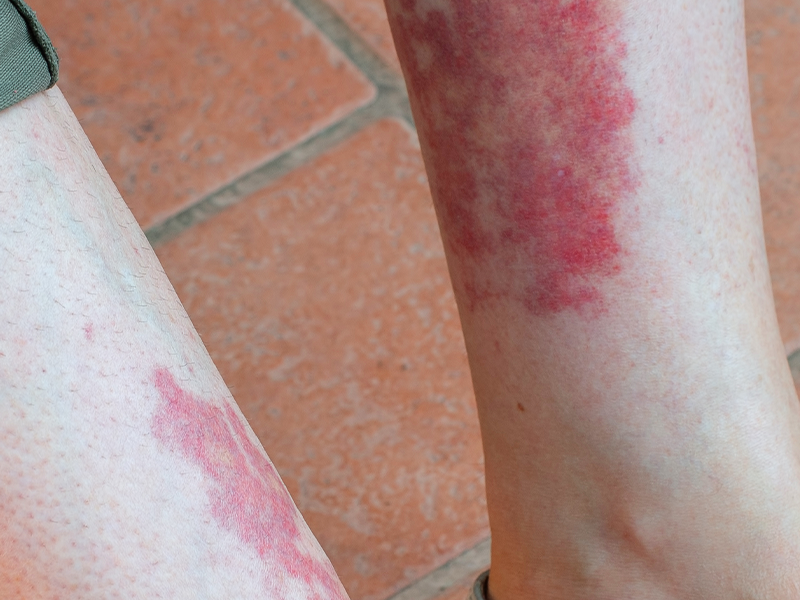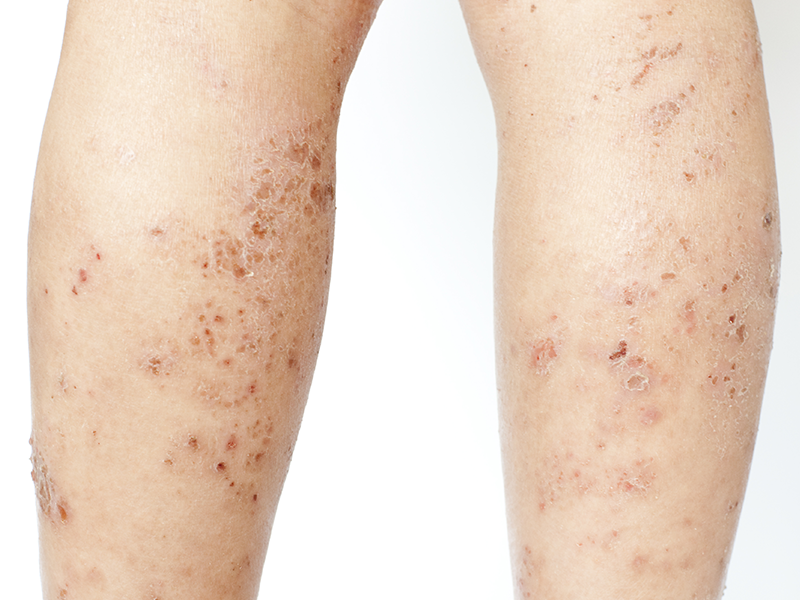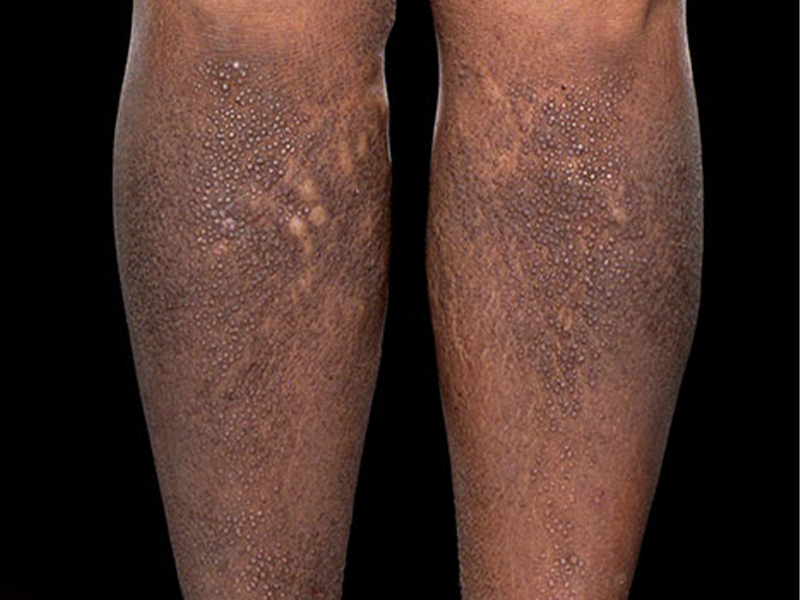Lichen planus (LP) is a relatively common condition characterised by an inflamed, extremely itchy rash that can affect many different parts of the body including the mouth, genitalia, nails and scalp. The most commonly affected sites include the wrists, ankles and lower back. It is usually seen in adults over the age of 40 and is not known to be a hereditary condition. It is not infectious and both men and women are equally susceptible.
Unfortunately, it is still not known what causes this disease to occur, though there is some evidence to suggest that it could be caused by a malfunction in the body’s immune system. Some drugs can also cause a temporary LP-like rash to develop which resolves slowly once the offending medication is stopped.



REQUEST A CALL BACK
Arrange a consultation with one of our expert dermatologists today.
WHAT DOES LICHEN PLANUS LOOK LIKE?
There are many different forms of LP which differ in appearance and the parts of the body they affect (see images).
Typically, LP appears as multiple purple/red shiny, flat-topped bumps that form on the skin in a symmetrical distribution across the body. As the individual bumps heal they change colour from red to purple, then to grey or brown. Sometimes there is scale on the surface of the bumps. Lichen Planus can form in line-shaped (linear) or ringlet-shaped (annular) areas and sometimes appears in scars.
The itching is the key symptom that affects people with Lichen Planus. The appearance of the rash can be distressing for some, especially if it occurs in intimate areas such as the genitalia. Furthermore, as the skin lesions heal, darkly pigmented blemishes may appear in their place which can take months or even years to resolve, particularly in those with a darker skin tone. If LP occurs on the scalp it can lead to patchy hair loss which may be permanent. Pitting, ridging or complete detachment of the nails eroded by LP can also look unsightly.
HOW IS LICHEN PLANUS TREATED?
Unfortunately, no treatment has been found to cure LP but thankfully in most patients it will resolve by itself within 1-2 years. However, about 20% of patients experience a recurrence, which can be many years after the initial episode.
The aim of treatment is therefore to control symptoms and potential options include:
- Emollients to prevent skin dryness
- Steroid creams or tablets to decrease the inflammation
- Ultraviolet light treatment (phototherapy)
- Drugs to calm the body’s immune system such as tacrolimus or ciclosporin
- Drugs to slow down the rate of turnover of skin cells such as acitretin
Our Specialist Dermatologists at the Harley Street Dermatology Clinic can offer effective treatment to patients with lichen planus.
For further information please visit the NHS website and read the British Association of Dermatology patient advice leaflet.
FREQUENTLY ASKED QUESTIONS
Is lichen planus contagious?
No, lichen planus is not contagious. It occurs when the immune system attacks cells of the skin.
How do I know if lichen planus is healing?
As this condition heals, it often leaves a dark brown discolouration of the skin. These will eventually fade over time.
What is the main symptom of lichen planus?
The itching is the key symptom that affects people with Lichen Planus. The appearance of the rash can be distressing for some, especially if it occurs in intimate areas such as the genitalia. Furthermore, as the skin lesions heal, darkly pigmented blemishes may appear in their place which can take months or even years to resolve, particularly in those with a darker skin tone. If LP occurs on the scalp it can lead to patchy hair loss which may be permanent. Pitting, ridging or complete detachment of the nails eroded by LP can also look unsightly.
How can I help alleviate symptoms at home?
- Avoid using soaps or body washes and just wash using warm water
- Wash your hair over a sink or bath so the shampoo doesn’t come into contact with your skin
- Use an emollient on the rash
- Avoid wearing tight clothes that rub against the skin
- If in the mouth, brush your teeth carefully and keep your gums healthy and avoid salty, spicy and acidic foods as well as alcohol
WHY CHOOSE THE HARLEY STREET DERMATOLGY CLINIC?
Having the right dermatologist is important especially when you have a chronic skin condition that will require ongoing treatment. We want you to feel confident that we’re providing you with the best possible care. We also want you to feel as comfortable as possible with your dermatologist.
The Harley Street Dermatology Clinic specialises in conditions affecting the skin, hair and nails. Our goal is to provide all the care that you need when you’re experiencing these kinds of problems. We want to make it easy for you to access the best quality treatment and support in London.
The clinic is conveniently located in Central London, so it’s easy to visit us if you need to see a dermatologist. You will find yourself in a very comfortable and welcoming environment. We have created a relaxing space where you will receive the highest quality of care. We are regulated by the Care Quality Commission, are part of the British Association of Dermatologists and are top rated by patients of Doctify so you can be sure of safe and effective treatment with us.
CONTACT US
Finding Us
The Harley Street Dermatology Clinic
35 Devonshire Place
London
W1G 6JP
The clinic can be accessed by public transport, on foot or by car. There is paid on street parking around the Harley Street district. The nearest tube stations are Regent’s Park and Baker Street, and Marylebone train station is a 15 minute walk away.
Contact Details
Opening Hours
While appointments can be made available outside usual hours in special circumstances, our core hours are:
Monday: 8am - 6pm
Tuesday: 8am - 6pm
Wednesday: 8am - 6pm
Thursday: 8am - 6pm
Friday: 8am - 6pm
Saturday : 10am - 2pm
Sunday: Closed
REQUEST A CALL BACK
Please fill in this form and one of our team will give you a call back to arrange a consultation with one of our expert dermatologists.
